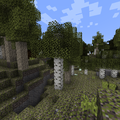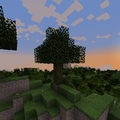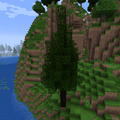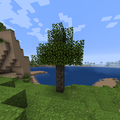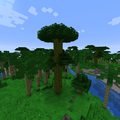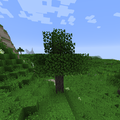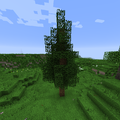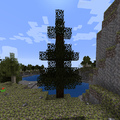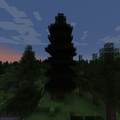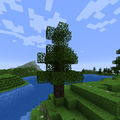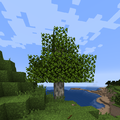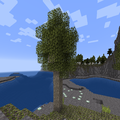Difference between revisions of "Trees"
(added sapling and log images, resized them on the page) |
(everything) |
||
| Line 1: | Line 1: | ||
| − | {{ToDo|everything}}{{Old}} | + | {{ToDo|everything}} |
| + | |||
| + | everything | ||
| + | |||
| + | {{Old}} | ||
==Obtaining== | ==Obtaining== | ||
Revision as of 07:17, 3 May 2021
| ToDo: Something is missing! Help fill out the following missing information:
everything
|
everything
| This page/section was imported/copied from the TFC-Classic Wiki! The information provided by this page/section was imported/copied from the Classic wiki and is likely outdated, missing information and not up to standards. Do not use it as a reliable source of information, if you can improve it please feel free to improve it!
|
Obtaining
Trees generate naturally in the world as well as grow naturally from saplings. A sapling must be planted for a certain amount of in-game days depending on the type, and have at least a light level of 9 before there is a chance for it to sprout into a tree. Trees are generated in biome-like areas, with each area having two primary trees, and a single secondary tree. Note: It is possible for both primaries and the secondary to all be the same type of tree, resulting in a forest of just that species. What type of trees can spawn in an area depends on the climate.
Types
| Tree | Temperature | Rainfall | EVT | |||
|---|---|---|---|---|---|---|
| Min | Max | Min | Max | Min | Max | |
| Grid Sapling (Acacia).png Acacia | 28 | 50 | 500 | 16000 | 2 | 2 |
| Grid Sapling (Ash).png Ash | 4 | 24 | 250 | 16000 | 0.5 | 2 |
| Grid Sapling (Aspen).png Aspen | -5 | 18 | 300 | 1600 | 0.25 | 1 |
| Grid Sapling (Birch).png Birch | -10 | 12 | 200 | 500 | 0 | 1 |
| Grid Sapling (Chestnut).png Chestnut | 3 | 24 | 250 | 16000 | 0 | 1 |
| Grid Sapling (Douglas Fir).png Douglas Fir | 1 | 14 | 750 | 16000 | 0 | 1 |
| Grid Sapling (Hickory).png Hickory | 4 | 28 | 250 | 16000 | 0 | 1 |
| Grid Sapling (Kapok).png Kapok | 30 | 50 | 2000 | 16000 | 0 | 1 |
| Grid Sapling (Maple).png Maple | 3 | 20 | 250 | 16000 | 0 | 1 |
| Grid Sapling (Oak).png Oak | 5 | 25 | 500 | 1200 | 0.25 | 2 |
| Grid Sapling (Pine).png Pine | -15 | 24 | 250 | 16000 | 0.5 | 2 |
| Grid Sapling (Sequoia).png Sequoia | 10 | 16 | 4000 | 16000 | 0 | 0.5 |
| Grid Sapling (Spruce).png Spruce | -5 | 24 | 250 | 16000 | 0 | 1 |
| Grid Sapling (Sycamore).png Sycamore | 6 | 30 | 400 | 16000 | 0 | 1 |
| Grid Sapling (White Cedar).png White Cedar | -5 | 24 | 250 | 16000 | 0 | 2 |
| Grid Sapling (White Elm).png White Elm | 4 | 30 | 400 | 16000 | 0 | 1 |
| Grid Sapling (Willow).png Willow | 10 | 30 | 4000 | 16000 | 0 | 0.5 |
Usage
Logs
Trees require the use of an axe to cut down. Chop the bottom-most log to fell the entire tree. If the axe does not have enough durability to fell the entire tree, as many logs as possible starting from the top of the tree will be chopped and the axe will break. Leaves disappear without dropping anything. Using a stone axe yields fewer logs than using a metal axe.
Sticks & Saplings
In order to get sticks and saplings from leaves, they must be destroyed before cutting the tree down. Using a scythe makes stick gathering more efficient by destroying a 3x3x3 area of leaf blocks at once, centered at the broken block. Using the Scythe decreases the drop rate of sticks and saplings from 6% to 4%. Breaking leaf blocks is one of two ways to obtain sticks from trees, the other being hitting placed or natural logs with any hammer to make it drop 1-3 sticks.
Properties
Different trees have different properties, summarized by the following table. Some trees may be more desirable for specific purposes than others. For example, Douglas Fir trees are relatively large and fast growing, making them an excellent choice to farm for making charcoal.
| Tree | Growth Speed | Burn Length | Burn Temperature |
|---|---|---|---|
| Grid Wood (Acacia).png Acacia | N/A¹ | Shortest | Dark Red** |
| Grid Wood (Ash).png Ash | 7 to 8 Days | Shorter | Dark Red*** |
| Grid Wood (Aspen).png Aspen | 8 to 9 Days | Shortest | Dark Red* |
| Grid Wood (Birch).png Birch | 7 to 8 Days | Long | Dark Red** |
| Grid Wood (Chestnut).png Chestnut | 7 to 8 Days | Short | Dark Red** |
| Grid Wood (Douglas Fir).png Douglas Fir | 7 to 8 Days | Short | Dark Red**** |
| Grid Wood (Hickory).png Hickory | 10 to 11 Days | Longer | Bright Red |
| Grid Wood (Kapok).png Kapok | N/A¹ | Shortest | Dark Red** |
| Grid Wood (Maple).png Maple | 7 to 8 Days | Longer | Bright Red |
| Grid Wood (Oak).png Oak | 10 to 11 Days | Longest | Dark Red**** |
| Grid Wood (Pine).png Pine | 7 to 8 Days | Shorter | Dark Red* |
| Grid Wood (Sequoia).png Sequoia | 11 to 12 Days | Long | Dark Red* |
| Grid Wood (Spruce).png Spruce | 7 to 8 Days | Short | Dark Red |
| Grid Wood (Sycamore).png Sycamore | 8 to 9 Days | Long | Dark Red** |
| Grid Wood (White Cedar).png White Cedar | 7 to 8 Days | Short | Dark Red* |
| Grid Wood (White Elm).png White Elm | 10 to 11 Days | Long | Dark Red** |
| Grid Wood (Willow).png Willow | 11 to 12 Days | Shortest | Dark Red |
¹There is currently no way to obtain Acacia or Kapok saplings other than cheating them in.
Gallery
- Acacia Tree.png
Acacia Tree
- Ash Tree.png
Ash Tree
- Aspen Tree.png
Aspen Tree
- White Elm Tree.png
White Elm Tree
- Willow Tree.png
Willow Tree
